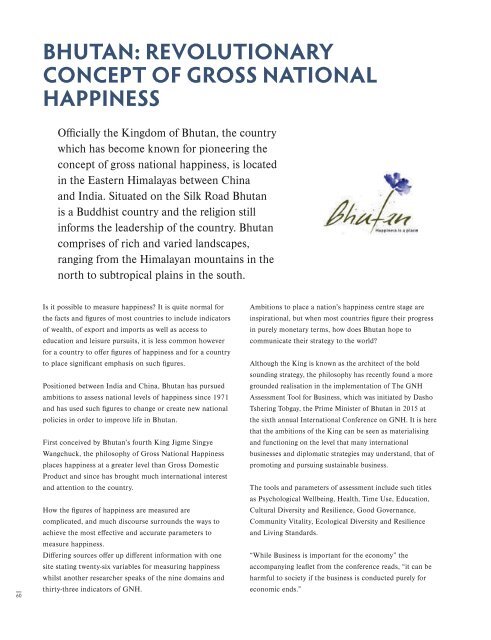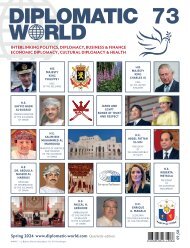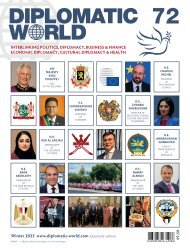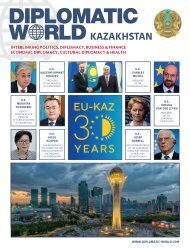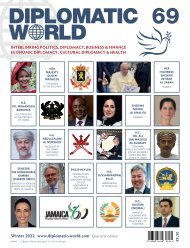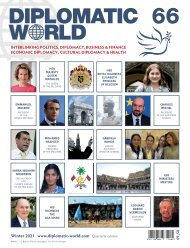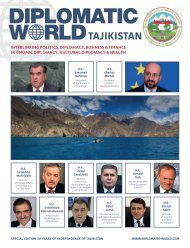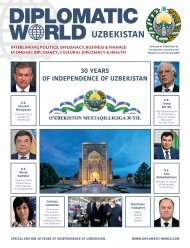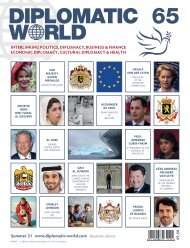Diplomatic World_nummer 57
Create successful ePaper yourself
Turn your PDF publications into a flip-book with our unique Google optimized e-Paper software.
BHUTAN: REVOLUTIONARY<br />
CONCEPT OF GROSS NATIONAL<br />
HAPPINESS<br />
Officially the Kingdom of Bhutan, the country<br />
which has become known for pioneering the<br />
concept of gross national happiness, is located<br />
in the Eastern Himalayas between China<br />
and India. Situated on the Silk Road Bhutan<br />
is a Buddhist country and the religion still<br />
informs the leadership of the country. Bhutan<br />
comprises of rich and varied landscapes,<br />
ranging from the Himalayan mountains in the<br />
north to subtropical plains in the south.<br />
60<br />
Is it possible to measure happiness? It is quite normal for<br />
the facts and figures of most countries to include indicators<br />
of wealth, of export and imports as well as access to<br />
education and leisure pursuits, it is less common however<br />
for a country to offer figures of happiness and for a country<br />
to place significant emphasis on such figures.<br />
Positioned between India and China, Bhutan has pursued<br />
ambitions to assess national levels of happiness since 1971<br />
and has used such figures to change or create new national<br />
policies in order to improve life in Bhutan.<br />
First conceived by Bhutan’s fourth King Jigme Singye<br />
Wangchuck, the philosophy of Gross National Happiness<br />
places happiness at a greater level than Gross Domestic<br />
Product and since has brought much international interest<br />
and attention to the country.<br />
How the figures of happiness are measured are<br />
complicated, and much discourse surrounds the ways to<br />
achieve the most effective and accurate parameters to<br />
measure happiness.<br />
Differing sources offer up different information with one<br />
site stating twenty-six variables for measuring happiness<br />
whilst another researcher speaks of the nine domains and<br />
thirty-three indicators of GNH.<br />
Ambitions to place a nation's happiness centre stage are<br />
inspirational, but when most countries figure their progress<br />
in purely monetary terms, how does Bhutan hope to<br />
communicate their strategy to the world?<br />
Although the King is known as the architect of the bold<br />
sounding strategy, the philosophy has recently found a more<br />
grounded realisation in the implementation of The GNH<br />
Assessment Tool for Business, which was initiated by Dasho<br />
Tshering Tobgay, the Prime Minister of Bhutan in 2015 at<br />
the sixth annual International Conference on GNH. It is here<br />
that the ambitions of the King can be seen as materialising<br />
and functioning on the level that many international<br />
businesses and diplomatic strategies may understand, that of<br />
promoting and pursuing sustainable business.<br />
The tools and parameters of assessment include such titles<br />
as Psychological Wellbeing, Health, Time Use, Education,<br />
Cultural Diversity and Resilience, Good Governance,<br />
Community Vitality, Ecological Diversity and Resilience<br />
and Living Standards.<br />
“While Business is important for the economy” the<br />
accompanying leaflet from the conference reads, “it can be<br />
harmful to society if the business is conducted purely for<br />
economic ends.”


